Roborock Q Revo vs S7 MaxV Ultra: These top-tier Roborocks share a lot in common, including a bristle-less brush roller, a multifunctional home base, an upgraded mop pad, LIDAR navigation technology, etc. So which is the better Roborock to buy? My short answer is the latter.
The Roborock S7 MaxV Ultra has better overall cleaning performance, even though it has lower airflow. It is also very good at dodging obstacles, including pet feces and cables, which the Roborock Q Revo struggles with. What’s more, its front-facing camera can double as a CCTV camera, and you can even steer it like a remote-controlled car.
Roborock Q Revo Vs S7 MaxV Ultra: Comparison Chart




Roborock Q Revo Vs S7 MaxV Ultra: Differences
The S7 MaxV Ultra defeated the Roborock Q Revo with a 4-2 win. Let’s delve deeper into my comprehensive comparison of these two Roborock’s flagships!
Cleaning Performance
Winner: Roborock S7 Maxv Ultra
Airflow
| Roborock Q Revo | Roborock S7 MaxV Ultra | |
|---|---|---|
| Quiet | 9.68 CFM | 7.7 CFM |
| Balanced | 11.67 CFM | 8.1 CFM |
| Turbo | 14.52 CFM | 10.2 CFM |
| Max | 17.91 CFM | 12.2 CFM |
| Max+ | NA | 13.9 CFM |
One of the critical metrics for a robot vacuum is airflow, or how much air passes through its brush roll when it is on. As you can see, the Q Revo outperforms the S7 MaxV at all power levels. Does that mean the Q Revo cleans better than the S7 MaxV? Well, not really!
Hard Floor
| Roborock Q Revo | Roborock S7 MaxV Ultra |
|---|---|
| ≈ 99% | ≈ 97% |
On my hardwood floor, the Q Revo slightly outperformed the S7 MaxV, though the disparity is inconsequential. Both proved themselves to be the ideal choice among the various robots out there for cleaning this specific type of flooring.
Carpet
| Roborock Q Revo | Roborock S7 MaxV Ultra | |
|---|---|---|
| Low-pile Carpet | ≈ 94% | ≈ 98% |
| High-pile Carpet | ≈ 90% | ≈ 92% |
Unlike my hard floor experiments, the S7 MaxV was better on my low- and high-pile carpets. This was somewhat surprising, considering it has a lower airflow. Anyway, both showcased commendable performances.
Hair
| Roborock Q Revo | Roborock S7 MaxV Ultra | |
|---|---|---|
| 5-inch Strands | ≈ 62% | ≈ 83% |
| 10-inch Strands | ≈ 55% | 63% |
I also compared how well each robot can pick up hair, focusing on strands measuring five and ten inches in length. The S7 MaxV Ultra was better, collecting significantly more hair compared to the Q Revo, so if you need something for cleaning hair, the S7 MaxV is definitely the better option. The absence of bristles on their rubber rollers simplified the cleaning task at the end of the day.
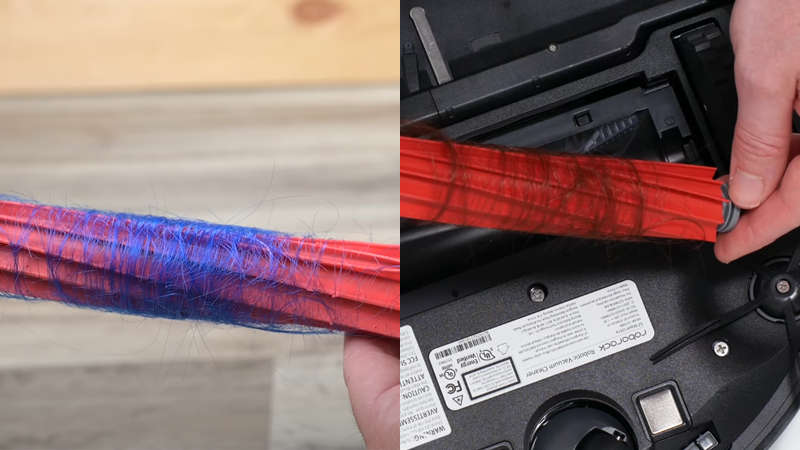
Design & Usability
Winner: Roborock S7 Maxv Ultra
Dimensions & Weight
| Roborock Q Revo | Roborock S7 MaxV Ultra | |
|---|---|---|
| Dimensions (W x H) | 13.9 x 3.8 inches | 13.9 x 3.8 inches |
| Weight | 10 lbs | 10.36 lbs |
Like other Roborocks, the Q Revo and S7 MaxV both feature a round, pucked-shaped frame and a LiDAR turret. This design allows them to easily traverse around cramped spaces and (almost) never get wedged, but they struggle more to get under some low-clearance furniture compared to models utilizing built-in cameras for navigation.
Extractor & Side Brush
The newer bristle-less brush roller on these Roborocks is a noteworthy improvement over the combo brushes featured in older models like the Q5+. This roller not only reduces the likelihood of tangles but also facilitates easier cleaning, as hair doesn’t coil around it as tightly.
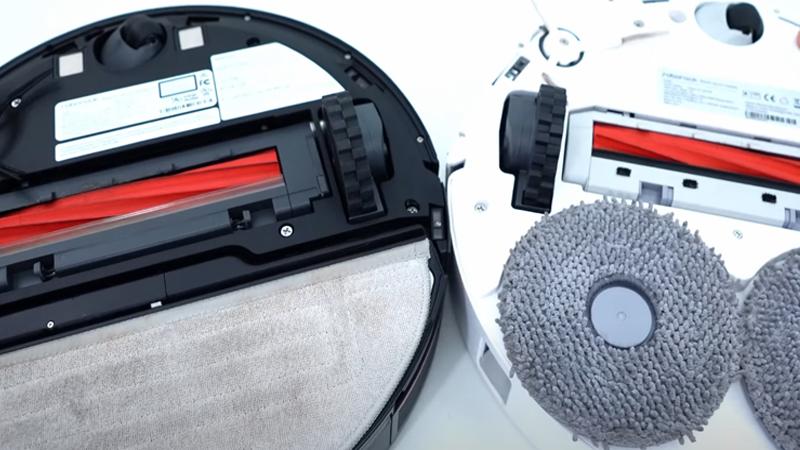
They use the same main brush roll, but they differ in their side brushes: The Q Revo features a 3-prong side brush, while the S7 MaxV uses a 5-pronged version. There is almost no difference in cleaning performance between them, but the all-rubber brush on the S7 MaxV indisputably outlasts the bristled-tip one on the Q Revo in terms of durability.
Navigation
These Roborock robotic vacuums use LIDAR (or Laser Distance Sensor) technology, leveraging laser beams to create a detailed map and navigation.
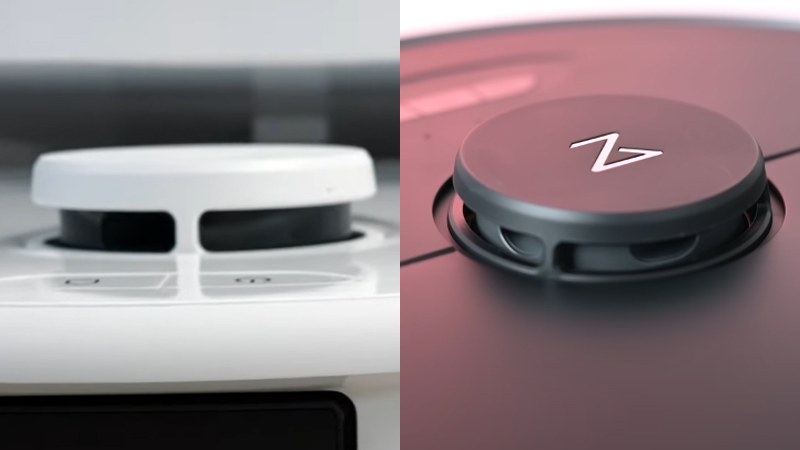
There are many pros to this laser-based technology: It operates with more speed and precision compared to vSLAM, the camera-based navigation technology, and doesn’t rely on light sources for functionality. However, these robots do come with an added protrusion on top, increasing their overall height, which might pose challenges with lower clearance furniture.
Both have a map-saving feature, enabling you to save up to 4 floor levels – a standard for all Roborock bots. This is extremely useful for multi-story homes since it enables these robots to recognize different levels of your home and create new maps instead of re-maps whenever they start a cleaning trip.
Both the Q Revo and S7 MaxV Ultra are designed to detect and avoid obstacles they encounter on their cleaning journey, but they utilize disparate obstacle avoidance technologies: the Q Revo relies on a front IR sensor, whereas the S7 MaxV is better with a twin-lens camera (an RGB camera and a 3D scanner) flanked by laser sensors.
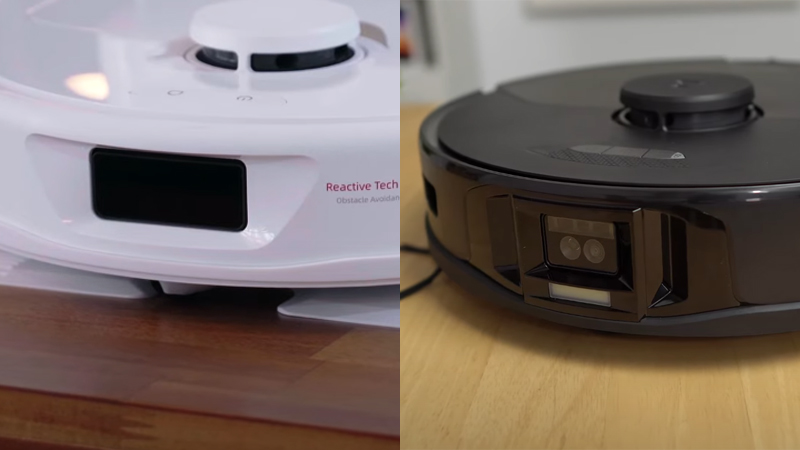
During my testing, both evaded most of my obstacles, including a shoe, mug, and bowl, but the Q Revo failed to detect and sidestep coiled wires. And while it can detect fake pet feces, it still approached them too closely, and its corner brush and body touched them lightly. So if you are a pet owner, don’t put all your trust in this one, and you should use it on a pre-cleaned floor.
Battery Life
| Roborock Q Revo | Roborock S7 MaxV Ultra | |
|---|---|---|
| Battery Life | ≈ 98–201 mins | ≈ 94–198 mins |
| Charging Time | ≈ 210 mins | ≈ 193 mins |
Both use a 5200 mAh battery, so there isn’t much variance in their awesome run time, and they nearly reach the advertised battery life of 180 minutes on the lowest power setting. Even better, like most other self-propelled robots, these bots are designed to automatically return to their docking stations to recharge when the battery level of the robot vacuum becomes low during a cleaning cycle. Then, they will return to the location where it left off and resume cleaning.
Control
Winner: Roborock S7 Maxv Ultra
Manual Control
These Roborocks are integrated with a variety of features to make them smarter and become your own, but most of them can only be accessed via the Roborock app. But if a full cleaning cycle is all you need, simply press the Power button on top of them instead of pulling out your phone. If needed, pressing the Home button will send these robots back to their base before completing their assigned tasks.
What the S7 MaxV has over the Q Revo is that it features a “Spot Cleaning” button, which directs this one to vacuum a small zone around itself. This feature is handy for quick cleanups in a specific area in lieu of cleaning an entire room or floor.
App Connectivity
Both the Q Revo and S7 MaxV Ultra are compatible with the free Roborock app and share a lot of functions. Some might be overkill, but most sure are fun to play around with.
Upon initial setup, these robots survey their environment to draw a map and show it within the app. If your house has multiple stories, they will save and remember up to four floors. The Roborock app can display the map in both 2D and 3D, and you can keep an eye on the location of your robot in real-time via the live map.
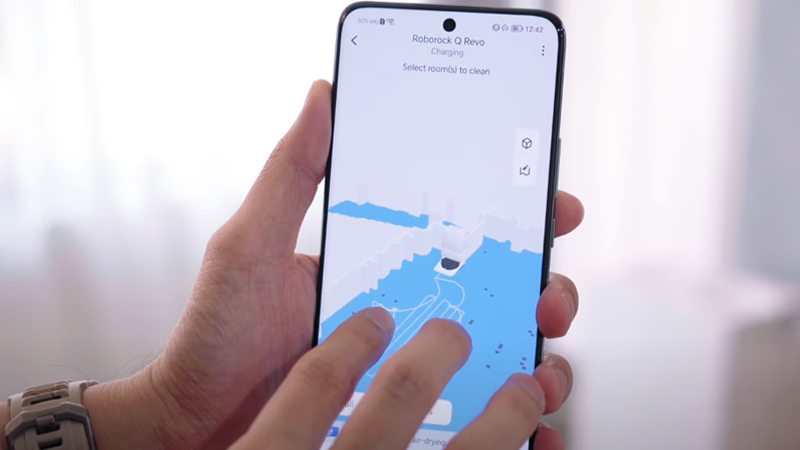
The app lets you merge or split rooms, rename them (using preset names or custom ones), and even set no-go zones, virtual walls, and no-mop zones. You can also create cleaning schedules, choose the power suction level, and check out the information related to the previous cleaning cycle. For added convenience, the app is compatible with Alexa and Google Assistant, facilitating voice-activated tasks like “Alexa, tell Roborock to clean my bed room.”
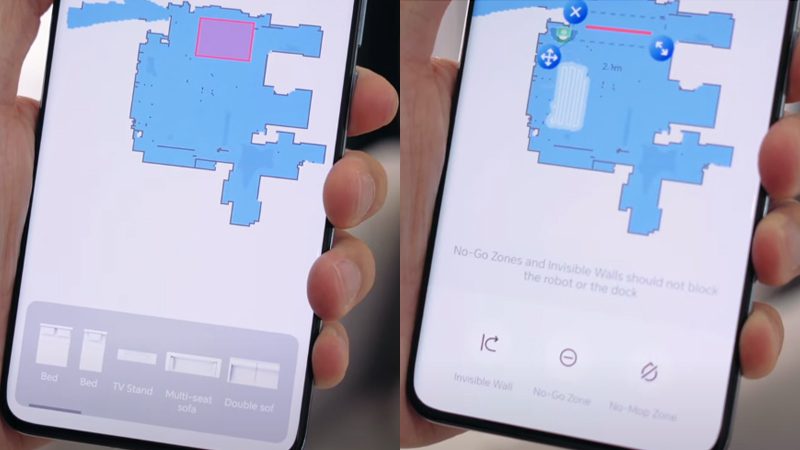
During the cleaning cycle, the S7 MaxV Ultra can capture snapshots of objects and transmit them to you through the app for verification. On the other hand, the Q Revo only shows cone-shaped things on the map, regardless of what obstacle it detects.
The S7 MaxV also has a remote viewing and driving feature, which enables you to control your robot while looking through the front-facing camera. You can even talk to your loved one and hear what they’re saying when you are not at home, thanks to its mic-and-speaker system.
Cleaning & Maintenance
Winner: Tie
The Q Revo is fitted with a 0.35-liter dustbin, compared to the 0.4-liter bin on the S7 MaxV. They are at the lower end of the capacity spectrum and need to be emptied quite often, but thankfully, you don’t need to get involved in this dirty business. It’s worth mentioning that both are integrated with an “all-in-one” tower that sends all the contents into a large disposable bag each time they return to the home base.
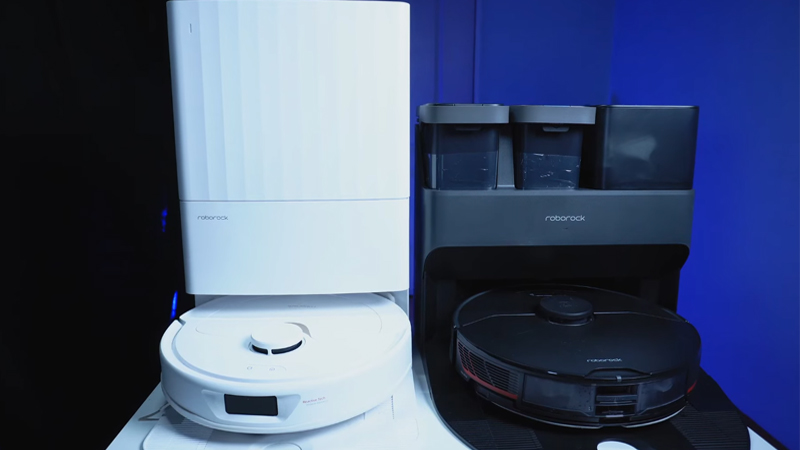
I called their home base “all-in-one” since, apart from emptying their bins, these towers can refill their water reservoirs when they are on mopping duty, wash their mop pads, and, even better, dry them with warm air. Do you know what that means? You don’t need to touch anything. Just leave when these bots start the cleaning cycle and return when they have finished their work. The only minor flaw is that they are mammoth-sized, but their elegant design ensures they are not an eyesore in any living environment.
Both use an E11-rated air filter to prevent dust and allergens from escaping. It is washable and should be cleaned monthly to dislodge all the dirt trapped in the folds. The app will also prompt you when it needs to be changed.
Other Features
Winner: Roborock Q Revo
Noise
| Roborock Q Revo | Roborock S7 MaxV Ultra | |
|---|---|---|
| Working | ≈ 45-67 dB | ≈ 53-74dB |
| Self-Emptying | ≈ 75 dB | ≈ 78 dB |
The Q Revo and S7 MaxV Ultra operate quite quietly, and you can still have a conversation with people nearby while these bots are running, except when they are in “Max mode.” They also produce pronounced noise during the emptying of their dustbins at the clean base.
Mopping Ability
Right off the bat, their mopping systems vary: the Q Revo uses a pair of spinning disc-shaped pads, while the S7 MaxV features a traditional half-circle mopping pad. The mopping ability of these Roborocks blew my mind and really was a game changer. I mean, I’ve tested a lot of hybrid robots, but the Q Revo and S7 MaxV stand out as some of the few models that genuinely perform well.
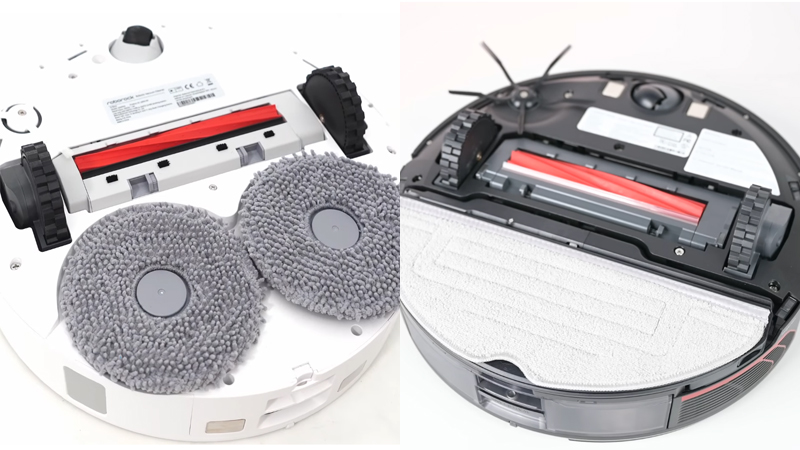
While numerous vacuum-and-mop robots just pull the mopping pads along the floor, both of these Roborocks incorporate agitating systems to tackle stubborn stains and dried-on spills effectively. As highlighted above, the Q Revo employs two counter-rotating mopping pads, while the S7 MaxV utilizes sonic mopping technology capable of scrubbing floors up to 3,000 times per minute.
I tried them on prune juice stains and red wine spills, and they did the job well with ease, leaving a spotless floor after the first pass. As for dried ketchup stains, these knights also performed impeccably – this is a good sign since struggling with dried-on stains is a widespread issue for many hybrid robots.
Both models also come equipped with an automatic mop-lifting feature to prevent their mop plates from coming into contact with your carpet or rug during the mopping process. The Q Revo’s mop can be elevated 5 mm off the ground, whereas the mop plate on the S7 MaxV can be raised up to 7 mm. Therefore, the latter won’t be effective on high-pile carpets, and setting no-mop zones via the app is still necessary.
Quick Rundown Of Roborock S7 MaxV Ultra
- S7 MaxV Ultra provides an extremely convenient, totally hands-free cleaning experience. Using the Empty Wash Fill Dock, you get automatic dust emptying, mop washing, and robot water tank refilling. The dock even cleans itself too
- Self-Refilling and Self-Emptying. The Empty Wash Fill Dock automatically refills the S7 MaxV water tank when it docks, extending its mopping range to up to 3230 sqft (300 sqm). The dock also empties the robot vacuum and holds enough dust for up to 7-weeks without emptying
- ReactiveAI 2.0. With Roborock’s next generation of obstacle avoidance technology, ReactiveAI 2.0, S7 MaxV can navigate around common domestic hazards using its RGB camera and a new neural processing unit. An additional light turns on in dark rooms, making obstacle recognition as effective at night as during the day. 3D structured light systems supplement the RGB camera and can spot unknown objects, determine their size and location, and allow the robot to navigate around them
- Next-Level Intelligence. Using its camera, S7 MaxV can now recognize the furniture in your home and place them on the map automatically. It can also identify your floors in each room and recommend cleaning patterns and scrub intensity accordingly
- The Most Powerful Roborock Robot Vacuum Ever. S7 MaxV has more suction power than any previous Roborock robot vacuum, generating a maximum of 5100 Pa. That’s more than double the power of S6 MaxV. It quickly picks up debris, hair, dust, and more from hard floors and carpets
Quick Rundown Of Roborock Q Revo
Product Videos
Related Articles to Roborock Q Revo
- Roborock Q Revo Vs Dreame L10S Ultra: Which Smart Vacuum Reigns Supreme?
- Roborock Q Revo Vs Deebot T20: A Confrontation Between Two Self-Emptying Robots
- The Roborock Q Revo Vs S8 Ultra Showdown: A Comprehensive Face-off
- Roborock Q7 Vs Q Revo: Which Option Suits You Best?
- Roborock Q Revo Vs S8: An Ultimate Comparison Between Roborock’s Mid-range Robotic Vacuums
- Roborock Q Revo Vs Q7 Max: Duel of the Roborock Dust-Suckers
- Eufy X9 Pro Vs Roborock Q Revo: A Head-To-Head Comparison
- Roborock P10 Vs Q Revo: What Is The difference?
- Roborock Q Revo Vs Ecovacs X1 Omni: A Duel of Titans!
- Roborock Q Revo vs S7: Battle of the Cleaning Titans!
- Narwal Freo Vs Roborock Q Revo: Which One Is the Best Value Option?
- Roborock Q Revo Vs Xiaomi X10+: A Head-To-Head Comparison
- Roborock Q Revo Vs S7 Max: A Detailed Comparison Of Roborock’s Two Flagships
- Roborock Q Revo Vs S7 MaxV: Which Roborock Takes The Lead?
References:
- Roborock S7 Maxv Ultra: https://us.roborock.com/pages/roborock-s7-maxv
- Roborock Q Revo: https://us.roborock.com/pages/roborock-q-revo

Richard B. Schmidt is a prominent figure in the vacuum cleaner industry, boasting over 15 years of expertise. Armed with a Robotics Engineering degree from Northeastern University and a Master’s in Consumer Science from Harvard, his unique blend of technical knowledge and consumer insights positions him as a sought-after authority in vacuum cleaner evaluation. Richard’s career began at Dyson, where he contributed to the development of innovative vacuum models. Transitioning to advocacy and reviews, he co-founded the first Vacuum-focused blog in 2008, offering comprehensive analysis and user guides for various vacuum cleaners. In 2020, he founded RoboMop.net, providing ongoing insights through columns and buyer’s guides.
